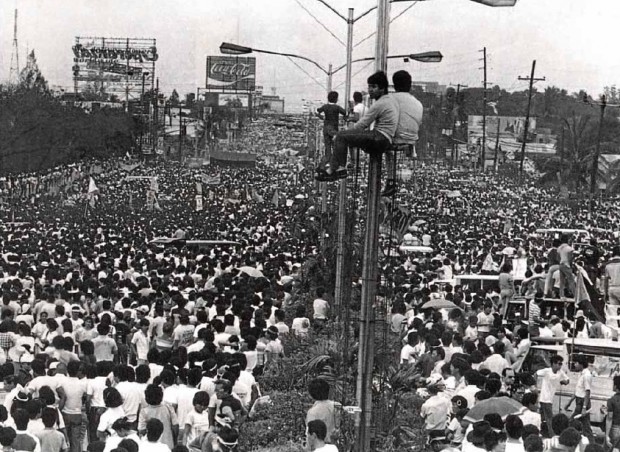
FILE PHOTO: Thousands of people jam Edsa on Feb. 23, 1986. The 1986 Edsa People Power Revolution served as a “beacon of hope” for millions, promising freedom, democracy, and equality. It also offered a new opportunity for improved Filipino workers’ rights. But some of the bright possibilities brought by the world-renowned bloodless uprising that led to the ouster of a dictator remained a promise 38 years later, according to labor leaders. PEOPLE POWER BOOK, THE PHILIPPINE REVOLUTION OF 1986
MANILA, Philippines — The 1986 Edsa People Power Revolution served as a “beacon of hope” for millions, promising freedom, democracy, and equality.
It also offered a new opportunity for improved Filipino workers’ rights. But some of the bright possibilities brought by the world-renowned bloodless uprising that led to the ouster of a dictator remained a promise 38 years later, according to labor leaders.
Federation of Free Workers president Sonny Matula said in a statement Thursday that the historic event engendered new goals for the prosperity of the country, including the labor sector.
“Yet, despite these goals, our country continues to face deep challenges that prevent the realization of these dreams for all Filipinos,” the labor lawyer said.
READ: Employers: A catastrophe to grant P100 wage hike
According to Matula, the administrations that came after the 1986 revolution failed to address the structural problems of Philippine society.
“Our leaders lacked the vision to tackle issues plaguing our society. Consequently, we ended up merely restoring the old system of formal political democracy,” he told INQUIRER.net in an interview.
READ: Senate approves P100 daily wage hike bill
Seven presidents have led the country since February 1986, including the son of post-Edsa revolt president Corazon Aquino – the Philippines’ 15th president, Benigno “Noynoy” Aquino – and the son of dicator Ferdinand Marcos Sr. – whose martial rule triggered the revolution, incumbent President Ferdinand “Bongbong” Marcos.
A new Constitution was also ratified in 1987, effectively signifying the start of this “new democratic era.”
However, this Charter’s ideals is yet to be fully implemented, pointed out Matula, specifically its “mandates on living wages, security of tenure, and the right to self-organization, which are essential for achieving the goals of Edsa.”
Realize 1987 Constitution’s purpose
Another labor leader, Partido Manggagawa (PM) president Renato Magtubo, said the 1987 Constitution’s provisions on labor are not being implemented properly.
READ: EDSA Day 1: February 22, 1986
“If you will look at it, the Constitution’s mandate on giving a living wage to workers is not realized,” Magtubo told INQUIRER.net in a separate interview.
Research group IBON Foundation earlier said that the current average nominal wage of P438 nationwide is just 36.5 percent of the P1,198 average family living wage.
READ: EDSA DAY 2: February 23, 1986
PM’s president also mentioned that the full protection of both organized and unorganized laborers under Article XIII, Section 3 of the 1987 Constitution is likewise not being implemented properly as labor union groups fall victim to red tagging.
Red tagging refers to the circumstance of individuals being labeled as members of communist groups even without evidence.
READ: EDSA DAY 3: February 24, 1986
“There are enabling laws on labor, but their implementation leaves much to be desired,” Magtubo stressed.
He likewise said that amid the push to amend the 1987 Constitution, it is more important to implement the current Charter instead of amending or revising it.
READ: EDSA DAY 4: February 25, 1986
Matula echoed this in his statement, saying that “before considering any form of Charter Change or amendments to the Constitution, it is crucial to fully implement the existing constitutional provisions in Article XIII or Protection to Labor and Social Justice.”
However, while the revolution and the subsequent 1987 Constitution is yet to fulfill their promise, Matula vowed that they will remain committed to making a difference towards economic democracy.
“The future still shines bright,” he said.
On February 25, 1986, millions of people gathered at Edsa united in a common goal to topple the dictatorship and usher development to the country through democracy.